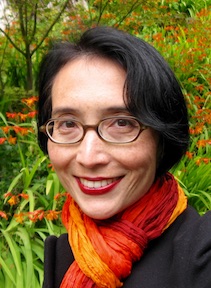By Francesca Paris
May-lee Chai’s work spans genres, eras, and languages. Her new collection of short stories, Useful Phrases for Immigrants, comes out in October and has already been hailed as essential reading.
Writing fiction like this new book was always Chai’s dream. But for some time, she thought she’d do that later in life, when it was more “practical.” First she planned on earning her PhD in art history and becoming a tenured professor.
That is, until she discovered a tumor growing in her breast.
“Once I thought I could die, I thought, ‘Feel free to dream,’” she said. So she turned down a full ride for a PhD program and went to the University of Colorado at Boulder to study creative writing instead.
She published her first novel, My Lucky Face, in 1997, and the successes kept coming. Her works today include fiction, nonfiction, translation, memoir, and more. She has won a literature grant from the National Endowment for the Arts, and an Asian/Pacific American Award for Literature for her 2013 novel, Tiger Girl.
The short stories in Useful Phrases for Immigrants traverse wide geographical, cultural, and emotional terrain. Chai writes about immigrants and the children of immigrants who are straddling their past and present, adjusting to new terrain, or revisiting their family histories.
In one story, inspired by a real crime, a construction crew discovers the naked body of a girl who had been trafficked. Chai says she intended the story to shed light on the precarious lives of immigrants in a big city in China, where they lack the same legal rights as someone born there.
“The importance of the story is not, ultimately, who did the crime,” Chai explained, “but the fact that the larger inequity is ongoing.”
Some of the stories in the book took root years ago, she says. But the idea for the collection itself bubbled up during the 2016 presidential primary, as a reaction to the anti-immigrant rhetoric of then Republican nominee Donald Trump.
“At the time I thought, there’s no closing that Pandora’s box,” said Chai. “The very fact that these terrible things have been said about immigrants, it’s going to reverberate.”
So, she cultivated her stories that highlighted economic anxiety and economic difficulties of Chinese immigrants, among other facets of their lives.
“I specifically thought about putting together a collection that would show over time, both in China and in the diaspora, how Chinese families are impacted by cultural and economic change,” she recalled.
Those families are central to the stories. Her writing burrows through layers of conflict, misunderstanding, and compassion in various fictional families, and they reflect Chai’s strong interest in familial relationships. She grew up as an older sibling to a younger brother, and watched her parents, both older siblings as well, contend with the dynamics of their own families.
“Family is how the characters negotiate their lives,” Chai said. “They’re part of something larger, and that larger unit is their family.”
As for her education, Chai never earned that PhD. Instead, she worked her way through three master’s degrees, including English-Creative Writing, East Asian Studies, and an MFA.
But her multi-disciplinary education began much earlier, when she was an undergraduate at Grinnell College. An advisor guided her through the distribution requirements in the liberal arts curriculum, ensuring that she would eventually be eligible for Phi Beta Kappa.
“Then I became aware of the significance of Phi Beta Kappa both culturally and academically,” she said. “And I’m so very grateful that I had a good adviser who looked at me that way.” Chai was inducted into Phi Beta Kappa at Grinnell in 1988.
Now she has the chance to advise students herself, as a creative writing professor at San Francisco State University. For her, the classroom serves as a community of writers, a place to talk craft, and a window to the stories her students are writing. Those are particularly exciting, she says, because they’re the stories no one’s ever read before.
Francesca Paris (ΦBK, Williams College, 2018) recently completed her bachelor’s degree in statistics and Arabic studies and is currently interning at NPR. Williams College is home to the Gamma of Massachusetts Chapter of Phi Beta Kappa.




